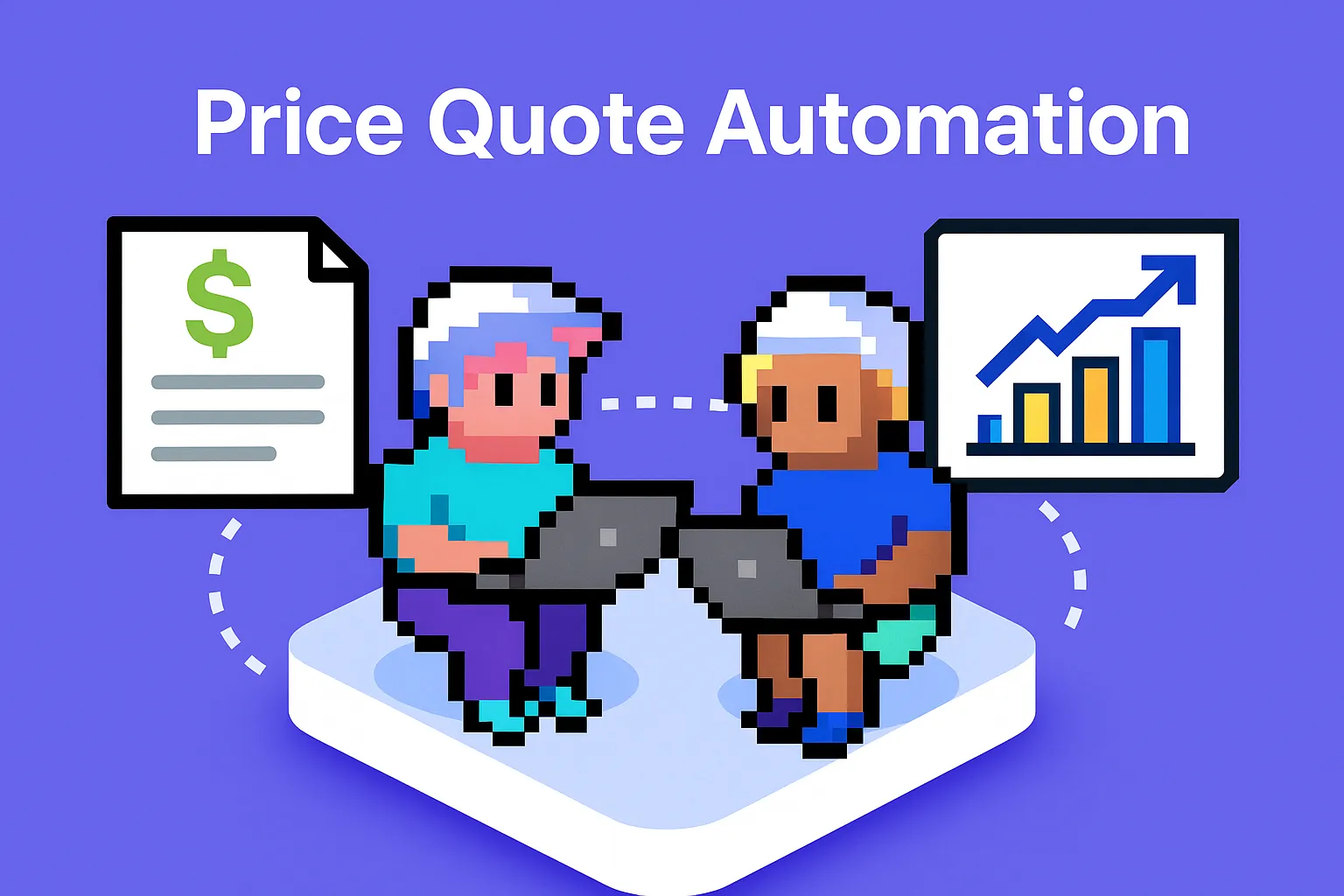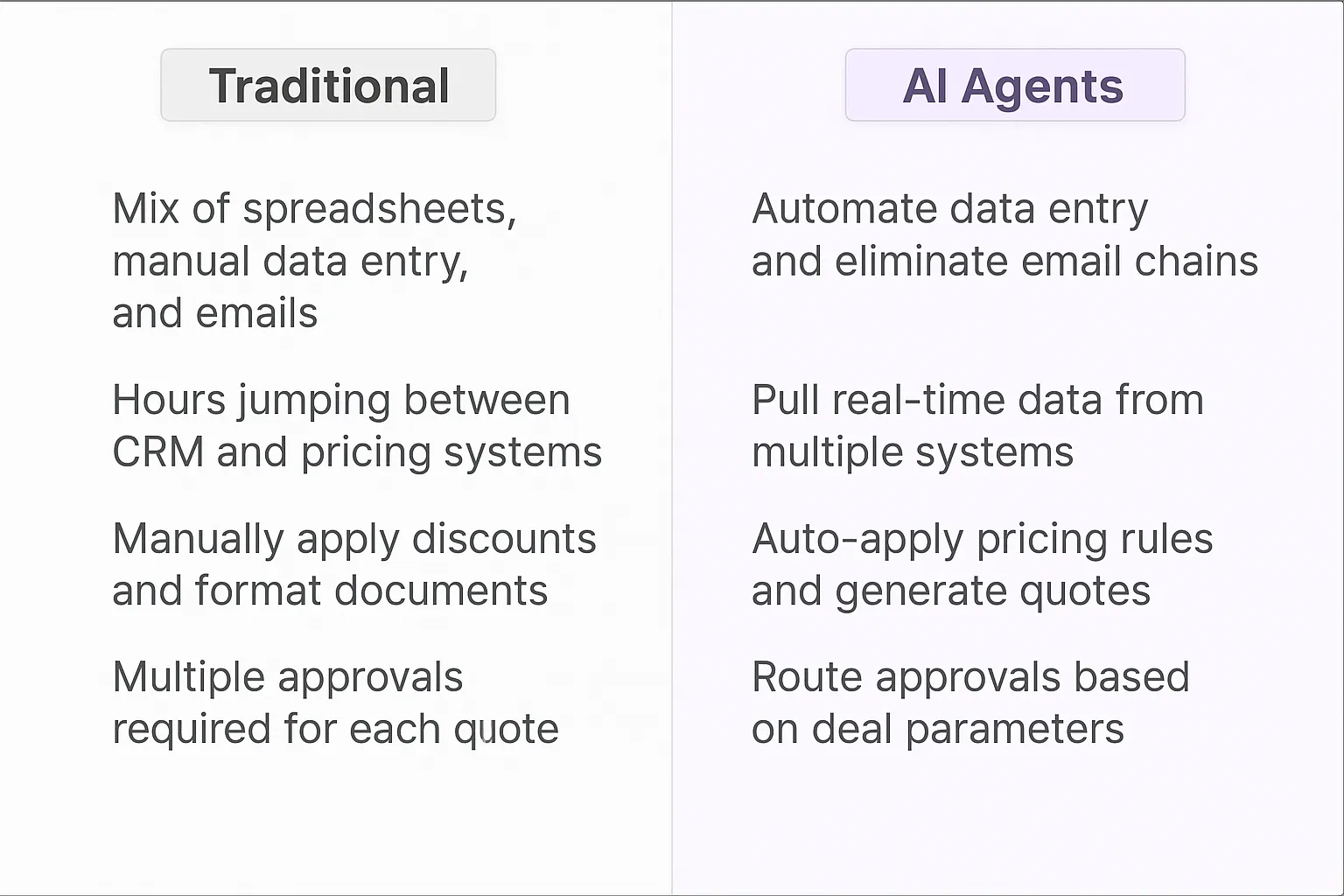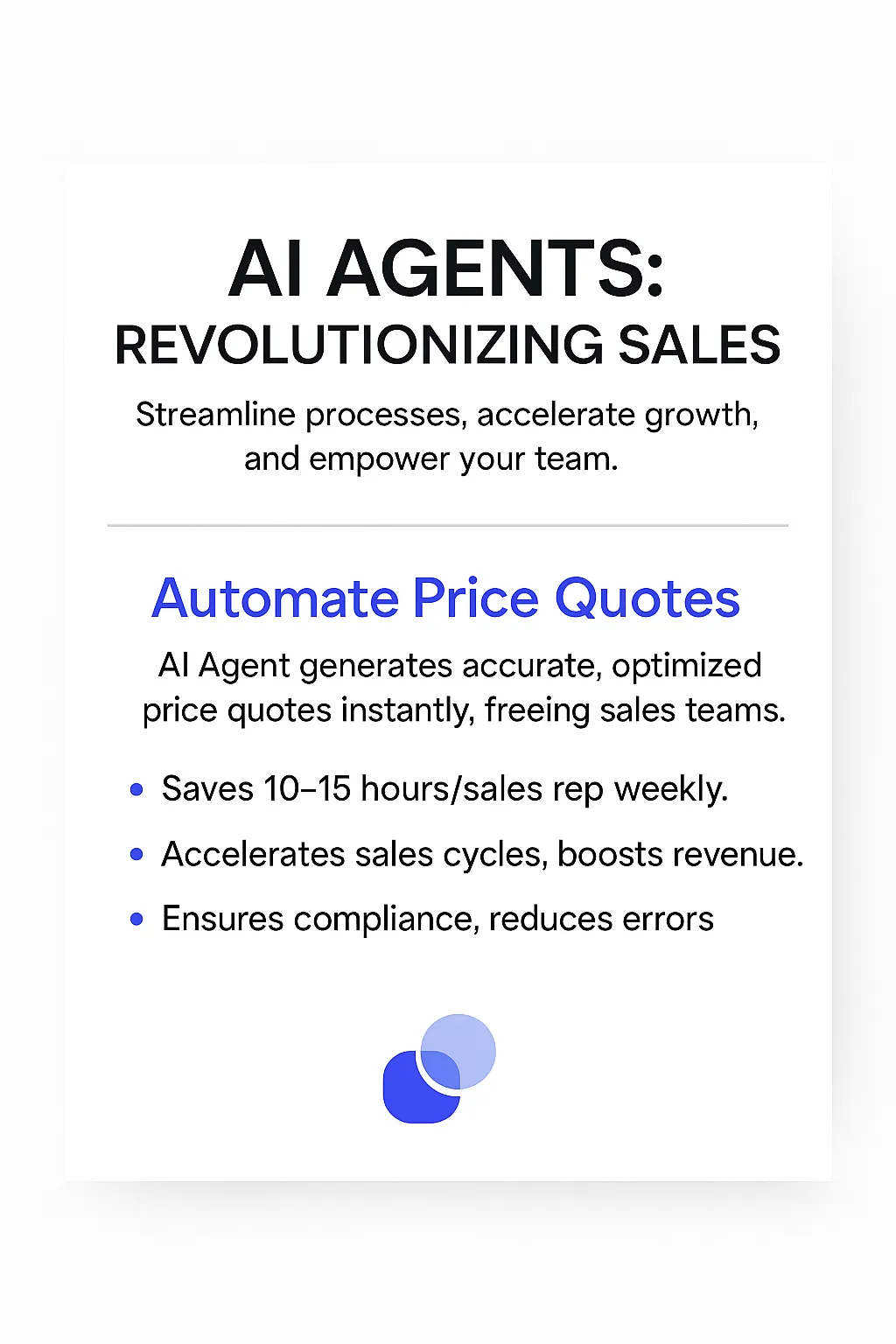Price Quote Automation AI Agents
Understanding AI-Powered Price Quote Systems
Price quote automation represents a sophisticated blend of artificial intelligence and workflow optimization that transforms how organizations handle pricing and proposal generation. Unlike traditional manual processes, this technology acts as an intelligent digital teammate that understands context, learns from historical data, and makes strategic pricing decisions. The system goes beyond simple automation by incorporating market dynamics, customer relationships, and business rules into every quote it generates.
Key Features of Price Quote Automation
- Real-time data integration across multiple systems
- Dynamic pricing adjustments based on market conditions
- Intelligent approval routing and version control
- Pattern recognition for optimal pricing strategies
- Automated compliance and legal term inclusion
- Historical analysis for continuous optimization

Benefits of AI Agents for Price Quote Automation
What would have been used before AI Agents?
The traditional price quote process was a painful mix of spreadsheets, manual data entry, and endless email chains. Sales teams would spend hours jumping between CRM systems, product catalogs, and pricing matrices. They'd manually calculate discounts, cross-reference customer histories, and format documents - all while trying to respond quickly enough to keep deals moving. The worst part? Every quote required multiple approvals, creating bottlenecks that killed deal momentum.
What are the benefits of AI Agents?
AI Agents fundamentally transform the quote-to-cash workflow through intelligent automation that actually understands context. These digital teammates can:
- Pull real-time pricing data and customer information from multiple systems simultaneously, eliminating manual lookups
- Apply complex pricing rules and discount structures automatically based on deal parameters, customer segment, and historical patterns
- Generate professionally formatted quotes in seconds while maintaining brand consistency and including all required legal terms
- Route approvals intelligently based on deal size, discount level, and other business rules
- Track quote versions and maintain a clear audit trail of all changes and approvals
The network effects are particularly powerful here - as more quotes flow through the system, the AI gets better at understanding pricing patterns, approval flows, and customer preferences. Sales teams can focus on relationship building and deal strategy instead of administrative tasks.
What's fascinating is how this shifts the growth curve for sales organizations. When you remove the operational friction from quoting, teams can handle significantly higher quote volumes without adding headcount. We're seeing companies reduce quote turnaround times from days to minutes while improving accuracy and compliance.

Potential Use Cases of AI Agents with Price Quote Automation
Processes
- Dynamic pricing adjustments based on real-time market conditions, competitor analysis, and inventory levels
- Multi-currency quote generation with automatic exchange rate updates and regional pricing rules
- Custom product bundle creation with intelligent discount structures
- Automated approval workflows for quotes exceeding specific thresholds
- Integration with CRM systems to pull customer history and apply personalized pricing
Tasks
- Generating detailed product specifications and technical requirements within quotes
- Calculating volume-based discounts and promotional pricing
- Converting verbal or email pricing requests into formatted quote documents
- Validating quote accuracy against pricing rules and business policies
- Creating follow-up reminders and tracking quote expiration dates
- Analyzing historical quote data to identify pricing patterns and optimization opportunities
The Growth Loop of Price Quote Automation
Price quote automation represents one of those rare opportunities where AI can create compounding advantages in sales operations. When sales teams deploy these digital teammates, they're not just saving time - they're building a data flywheel that gets smarter with each interaction.
The most successful implementations I've seen follow a pattern: First, the AI learns from historical quote data, understanding which prices led to wins versus losses. Then it starts suggesting optimal price points based on deal context, customer segments, and market conditions. As more quotes flow through the system, it refines its understanding of price elasticity and customer willingness to pay.
What's particularly fascinating is how this creates a network effect within organizations. Sales reps who leverage these AI capabilities close deals faster, which encourages adoption by other team members. The expanded usage generates more data points, making the system increasingly accurate in its price recommendations.
The end result isn't just efficiency - it's a fundamental transformation of how organizations approach pricing strategy and sales execution. Companies that get this right end up with a sustainable competitive advantage that's incredibly difficult for competitors to replicate.

Industry Use Cases
Price quote automation through AI agents represents one of those rare technological shifts that fundamentally changes how businesses operate. The versatility of AI agents in price quote automation creates measurable impact across multiple sectors, each with its own unique dynamics and requirements. When we examine specific industry applications, we see AI agents functioning as digital teammates that handle complex pricing scenarios while adapting to industry-specific rules and regulations.
What makes this particularly fascinating is how AI agents learn and evolve with each interaction, becoming increasingly proficient at understanding industry nuances. They're not just processing requests - they're developing pattern recognition that helps them anticipate customer needs and market shifts. This creates a compounding effect where the system becomes more valuable over time, similar to how network effects drive value in marketplace businesses.
The real power lies in how these AI agents transform traditionally manual, error-prone processes into precise, data-driven operations. They're particularly effective in industries where pricing complexity intersects with high transaction volumes, creating bottlenecks that traditionally required significant human intervention to resolve.
Manufacturing Equipment: Complex Quote Generation Made Simple
Manufacturing equipment sales teams face a unique challenge - generating accurate quotes for highly customized machinery and components. The traditional process involves sales reps manually juggling spreadsheets, product catalogs, and pricing matrices while trying to account for hundreds of variables like material costs, customization options, and volume discounts.
A Price Quote AI Agent transforms this process by acting as a specialized digital teammate for the sales force. When a rep needs to generate a quote, they simply share the customer requirements through natural conversation. The AI analyzes the specifications against current pricing data, applies relevant business rules, and produces a detailed quote within minutes instead of hours or days.
The real magic happens when handling complex configurations. For example, when quoting an industrial conveyor system, the AI automatically factors in belt width, motor specifications, safety guards, control systems, installation costs, and even regional compliance requirements. It pulls live commodity pricing for steel and components, applies appropriate margins, and includes relevant warranty terms.
Beyond just crunching numbers, the AI provides strategic insights during the quoting process. It might flag that ordering certain components together unlocks bulk discounts, or suggest alternative configurations that could better serve the customer's needs while maintaining healthy margins. This helps sales reps evolve from quote generators into true solution consultants.
The impact on sales velocity is dramatic - manufacturing companies using AI-powered quote automation typically see their quote turnaround time drop by 90% while accuracy improves to near 100%. More importantly, it gives sales teams back countless hours previously spent on manual calculations, letting them focus on what they do best - building relationships and solving customer problems.
Commercial Real Estate: From Complex Lease Quotes to Strategic Deals
Commercial real estate pricing has always been more art than science. Brokers traditionally spend days piecing together quotes for office spaces, retail locations, and industrial properties while accounting for countless variables like market rates, tenant improvements, and lease terms. I've seen firsthand how this manual approach creates bottlenecks and leaves money on the table.
A Price Quote AI Agent fundamentally changes this dynamic by serving as a specialized digital teammate for CRE firms. The AI ingests real-time market data, property specifications, tenant credit profiles, and historical lease comparables to generate sophisticated quotes in minutes. But what's particularly fascinating is how it handles the nuanced aspects of CRE deals.
Take a multi-floor office lease scenario: The AI analyzes floor plate efficiency, factors in building class and location premiums, calculates load factors, and even considers timing of other lease expirations in the building. It automatically adjusts pricing based on lease term length, desired tenant improvements, and parking requirements. The system even flags opportunities for blend-and-extend deals with existing tenants.
The real differentiator is how the AI learns from each transaction. Every completed deal enriches its understanding of market dynamics and pricing elasticity. It starts recognizing patterns - like which amenities command premium rates in specific submarkets or how different industries respond to various lease structures. This creates a powerful feedback loop that makes each subsequent quote more strategic.
What excites me most is seeing brokers evolve their role. Rather than getting bogged down in spreadsheet calculations, they're having deeper conversations about space utilization strategies and portfolio optimization. One broker told me they closed 40% more deals last quarter because they could respond to inquiries within hours instead of days. The AI isn't replacing the broker's judgment - it's amplifying their expertise and letting them focus on high-value client interactions.
Considerations & Challenges
Technical Integration Hurdles
Implementing price quote automation requires careful navigation of several technical complexities. The AI agent needs to interface seamlessly with existing CRM systems, ERP platforms, and pricing databases - each with their own data structures and API quirks. One major challenge is handling legacy systems that weren't built with AI integration in mind. Teams often discover that their historical pricing data isn't standardized or contains inconsistencies that need cleaning before the AI can effectively use it.
Data Quality & Maintenance
The accuracy of automated quotes lives and dies by data quality. Companies frequently underestimate the ongoing effort needed to maintain clean, updated product catalogs, pricing rules, and customer-specific agreements. When product specifications change or new offerings launch, the AI agent needs rapid updates to avoid quoting outdated information. This requires establishing robust data governance processes and clear ownership of pricing data maintenance.
Business Logic Complexity
Most organizations have evolved intricate pricing strategies over years - including volume discounts, market-specific pricing, seasonal adjustments, and customer tier benefits. Teaching an AI agent to navigate these nuanced decision trees while maintaining pricing strategy integrity is surprisingly complex. The system needs to understand not just the rules, but also their hierarchical relationships and exception handling.
Change Management Realities
Sales teams often resist automation tools that they perceive as threatening their autonomy or commission structure. Successful implementation requires thoughtful change management that positions the AI agent as a tool for enabling faster response times and more accurate quotes, rather than a replacement for human judgment. Sales reps need to understand how to effectively collaborate with the AI and when to apply their own expertise.
Compliance & Audit Requirements
Price quote automation must maintain clear audit trails and comply with industry regulations. The AI agent needs built-in controls to prevent unauthorized discounts or non-compliant quotes. This includes maintaining detailed logs of quote calculations, approval workflows, and any manual overrides. Organizations in regulated industries face additional challenges ensuring their automated quoting meets specific documentation requirements.
AI-Powered Price Quote Automation: A Strategic Evolution in Sales Operations
The integration of AI agents into price quote automation represents a fundamental shift in how organizations approach pricing strategy and sales execution. The technology's ability to learn and adapt creates compounding advantages that extend far beyond simple efficiency gains. Organizations that successfully implement these systems gain a significant competitive edge through faster response times, more accurate pricing, and the ability to scale their sales operations without proportional headcount growth. The real power lies in how these digital teammates free up human talent to focus on relationship building and strategic decision-making, ultimately driving better business outcomes.













